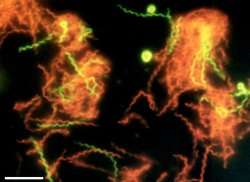Extremophile Hunt Begins

A team of scientists has just left the country to explore a very strange lake in Antarctica; it is filled with, essentially, extra-strength laundry detergent. No, the researchers haven't spilled coffee on their lab coats. They are hunting for extremophiles -- tough little creatures that thrive in conditions too extreme for most other living things.
Antarctica's Lake Untersee, fed by glaciers, always covered with ice, and very alkaline, is one of the most unusual lakes on Earth. The upper 70 meters of lakewater is so alkaline "its pH is like strong CloroxTM," says expedition leader Richard Hoover of NASA's Marshall Space Flight Center. "And to make it even more interesting, the lake's sediments produce more methane than any other natural body of water on our planet. If we find life here, it will have important implications."
Lake Untersee is a sort of test case for other exotic places around the solar system (namely Mars, comets, and the icy moons of Jupiter and Saturn) where life might be found in the extremes. Many of those places are cold and methane-rich--"not unlike Lake Untersee."
"One thing we've learned in recent years," notes Hoover, "is that you don't have to have a 'Goldilocks' zone with perfect temperature, a certain pH level, and so forth, for life to thrive." Researchers have found microbes living in ice, in boiling water, in nuclear reactors. These "strange" extremophiles may in fact be the norm for life elsewhere in the cosmos.
"With our research this year, we hope to identify some new limits for life in terms of temperature and pH levels. This will help us decide where to search for life on other planets and how to recognize alien life if we actually find it."
Hoover has already made some new friends in cold places. Earlier Hoover teams have found new species and genera of anaerobic microbial extremophiles in the ice and permafrost of Alaska, Siberia, Patagonia, and Antarctica.
"I found one extremophile in penguin guano," recalls Hoover. "When I stooped to pick it up, Jim Lovell, my research partner then, said, 'What the heck are you doing now, Richard?' But it paid off."
Most incredible, though, was the revelation a few years ago that some extremophiles the researchers found in an Alaskan tunnel actually came to life as the ice around them melted. These bacteria had endured being frozen for 32,000 years and were able to go back to "business as usual" as they thawed out. If microscopic creatures on Earth can do that, why not microscopic creatures on other planets?
The current expedition, consisting of Hoover, Valery Galchenko of Winogradsky Institute of Microbiology, and Dale Anderson of the SETI Institute, along with two polar logistics experts is a preliminary sortie to lay the groundwork for the full-up operations in December. The team will test key research equipment and conduct science at lakes in the Schirmacher Oasis in preparation for the later trip to those same lakes and on to Lake Untersee. The main expedition to continue and expand this research will include an international team of 12 to 14 American, Russian, and Austrian scientists and two educators.
Will these expeditions reveal never-before-seen microbial creatures capable of surviving the most extreme conditions? And would this mean that life exists elsewhere in the cosmos?
"You can find a lot just by looking," muses Hoover. "Nature keeps coming up with surprises."
Source: Science@NASA, by Dauna Coulter

















